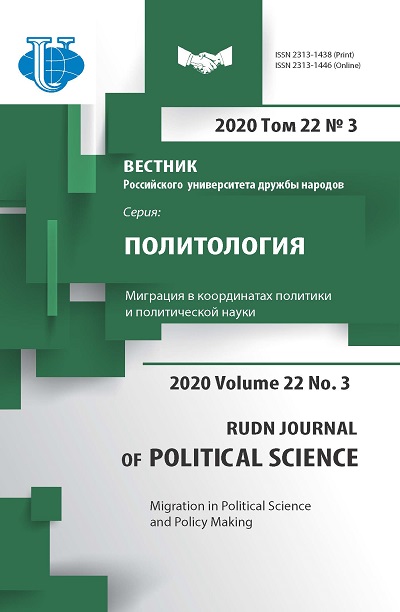Migration as a Reality and a Part of Political Mythology
- Authors: Malakhov V.S.1, Motin A.S.1
-
Affiliations:
- The Russian Presidential Academy of National Economy and Public Administration
- Issue: Vol 22, No 3 (2020)
- Pages: 327-338
- Section: MIGRATION: GLOBAL CONTEXT
- URL: https://journals.rudn.ru/political-science/article/view/24275
- DOI: https://doi.org/10.22363/2313-1438-2020-22-3-327-338
Cite item
Full Text
Abstract
The article is focused on the mythologized photos of the global migration phenomena circulating in the ordinary consciousness and in the media. Authors consider deconstruction of this mythology important for two reasons. Firstly, the reproduction of negative stereotypes about migration allows the right-wing populist parties and movements to accumulate political capital, provoking new waves of anti-migration sentiments and creating a vicious circle. Secondly, these sentiments directly or indirectly influence the decision-makers. As a result, decision-making process in the field of migration regulation become influenced by irrational factors. Turning to common misconceptions about international migration, authors show that: a) the mechanical extrapolation of modern demographic trends into the distant future and causal relationship between demographic indicators and migration processes are not scientifically justified; b) there is no direct correlation between the size of the population in less developed regions and the intensity of migration flows from these regions to industrialized countries; c) international migration is by no means a one-way “South - North” process; d) perception of “North” countries’ migration policies, as charity, is fundamentally wrong because it doesn’t take into account the complex interdependence of modern world. In addition, authors demonstrate inadequacy of the image of a “migratory tsunami” threatening to flood Europe.
About the authors
Vladimir S. Malakhov
The Russian Presidential Academy of National Economy and Public Administration
Author for correspondence.
Email: malakhov-vs@ranepa.ru
Doctor of Political Science, Professor, Head of the Center for Theoretical and Applied Political Studies, Institute for Social Sciences
84 Prospekt Vernadskogo, Moscow, 119571, Russian FederationAlexander S. Motin
The Russian Presidential Academy of National Economy and Public Administration
Email: motin-as@ranepa.ru
MA in Political Science and International Relations, Research Fellow of the Center for Theoretical and Applied Political Studies, Institute for Social Sciences
84 Prospekt Vernadskogo, Moscow, 119571, Russian FederationReferences
- Howard M. M. The Politics of Citizenship in Europe. Cambridge: Cambridge University Press; 2009.
- Freeman G. Modes of Immigration Politics in Liberal Democratic States. International Migration Review. 1995. 29 (4): 881–902.
- Schain М. 2006. The Extreme-Right and Immigration Policy-Making: Measuring Direct and Indirect Effects. West European Politics. 2006. 29 (2): 270–289.
- Malakhov V. Immigration regimes in the West and in Russia: theoretical and political aspects. Polis. Political studies. 2010. 3: 60–68. (In Russ.).
- Flood C. Political Myth: A Theoretical Introduction. London: Routledge; 2001.
- Bottici C. A Philosophy of Political Myth. Cambridge: Cambridge University Press; 2007.
- Yilmaz F. Right-wing hegemony and immigration: How the populist far-right achieved hegemony through the immigration debate in Europe. Current Sociology. 2012. 60 (3): 368–381.
- Lukassen G., Lubbers M. Who Fears What? Explaining Far-Right-Wing Preference in Europe by Distinguishing Perceived Cultural and Economic Ethnic Threats. Comparative Political Studies. 2011. 45 (5): 547–574.
- Lazaridis G., Campani G., Benveniste A., editors. The Rise of the Far Right in Europe: Populist Shifts and “Othering”. Palgrave Macmillan UK; 2016.
- Vishnevskii A.G. The demographic revolution is changing the reproductive strategy of the homo sapiens. Demograficheskoe obozrenie. 2014. 1 (1): 6–29 (In Russ.).
- Denisenko M. B., editor. Demographic aspects of socio-economic development. Moscow: MAKS Press. (In Russ.).
- Therborn C. The NATO Demographer. New Left Review. 2009. № 56 (March-April): 136–144.
- Easterly W. Tyranny of Experts. Moscow: Izd-vo Instituta Gaidara; 2016. (In Russ.).
- Gardner D. Future Babble: Why Expert Predictions Fail – and Why We Believe Them Anyway. Toronto: McClelland and Stewart; 2011.
- Messina A.M. The Logic and Politics of Post-WWII Migration to Western Europe. Cambridge: Cambridge University Press; 2007.
- Hollifield J., Martin Ph., Orrenius P., editors. Controlling Immigration: A Global Perspective. 3 edition. Stanford University Press; 2014.
- Oltmer J. Migration: History and Future of the Present. Darmstadt: Theiss; 2017. (In Germ.).
- Betts A., editor. Global Migration and Governance. Oxford: Oxford University Press; 2010.
- Geiger M., Pécoud A., editors. Disciplining the Transnational Mobility of People. NY: Palgrave; 2013.
- Kunz R., Lavenex S, Panizzon M., editors. Multilayered migration governance: the promise of partnership. Routledge; 2011.
- Malakhov V., Global Migration Governance: Theory, Institutions, Politics. Mirovaya ekonomika i mezhdunarodnye otnosheniya, 2019, 63 (10): 89–96. (In Russ.).
- Lacroix T., Desille A., editors. International Migrations and Local Governance: A Global Perspective. Palgrave Macmillan; 2018.
- Elcano Royal Insitute, Istituto Affari Internazionali. Italian and Spanish Approaches to External Migration Management in Sahel: Venues for Cooperation and Coherence. Working Paper. 13/2018.
- Castles S., Haas H., Miller M. The Age of Migration: International Population Movements in the Modern World. 6-th Edition, The Guilford Press; 2018.
- Andrienko Y., Guriev S. Understanding Migration in Russia. CEFIR Policy Papers. 2005. 23.
- Malakhov V.S., Mkrtchyan N.V., Vendina O.I., Florinskaya J.F., Varshaver E.A., Rocheva A.L. et al. International migration and sustainable development of Russia. Moscow: Delo; 2015. (In Russ.).
















